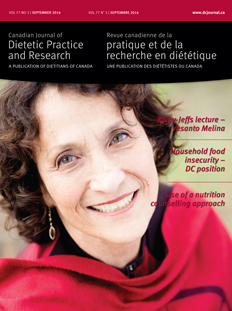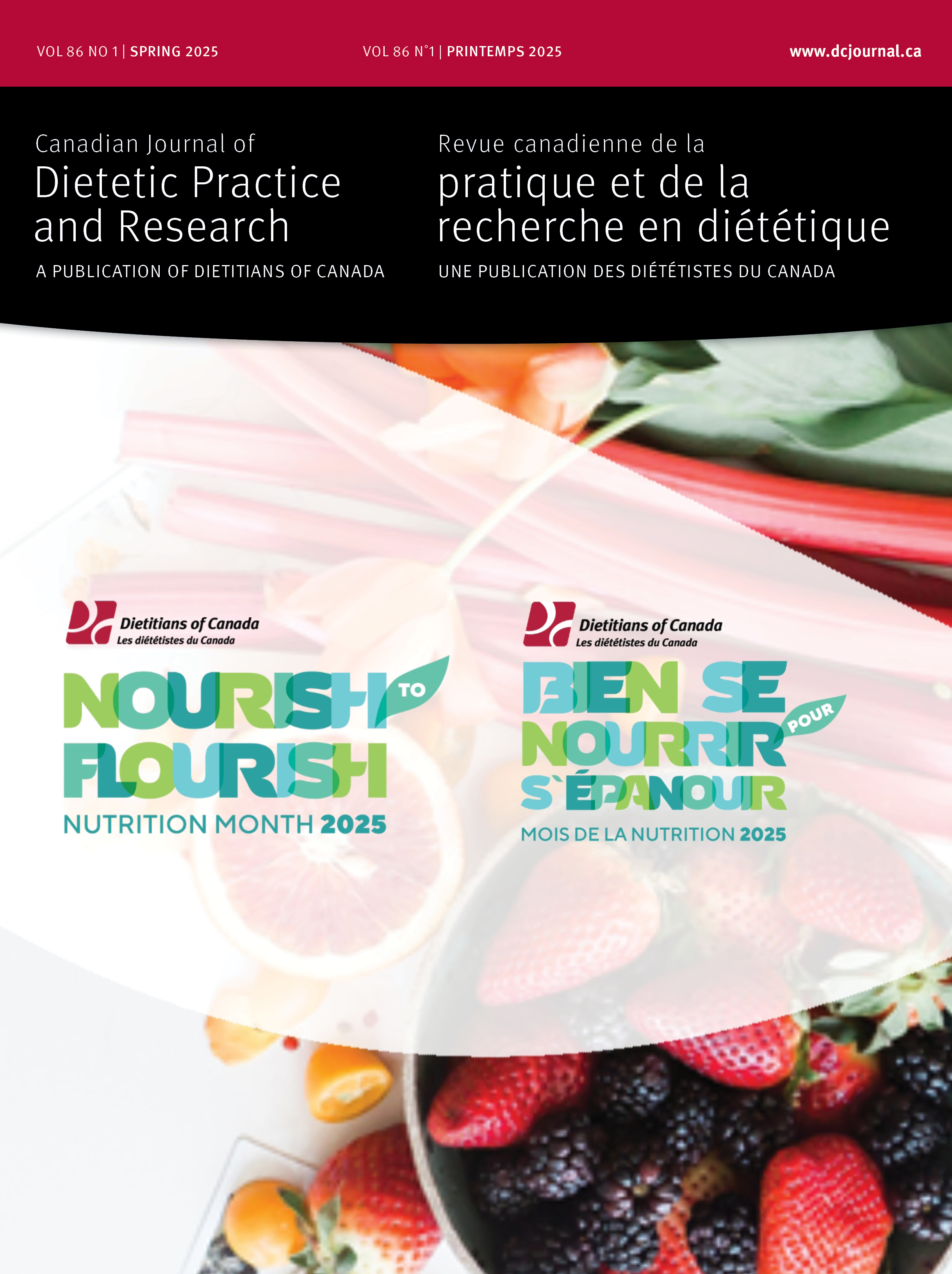Volume 77 • Number 3 • September 2016
Chair's Message
Editor's Message
Research
Purpose: Food knowledge and skills appear to have declined in the general population over recent decades and may be contributing to negative outcomes and poor nutritional health. It is pertinent to observe the food skills and habits of Canadians, particularly Canadian youth. Methods: Data from the Canadian Community Health Survey 2013 Rapid Response on Food Skills (n = 10 098) were used to examine the involvement of children in food preparation processes by identifying and describing the role of children in meal preparation as well as the practice of family meals. Variables were examined to assess differentiations between socio-demographic groupings (marital status, education, and income). Results: Results indicate a moderate to high level of child participation in Canadian household food-related activities, with two-thirds of households with children having children involved in choosing meals and grocery shopping and one-third of children helping with meal preparation. Some differences were observed between region, education level, and Aboriginal and immigration status. Seventy-five percent of respondents participated in family meals. Conclusions: Data from this study contribute to the current discussion regarding loss of food skills and the significance of family meals on social and health indicators. Results suggest a range of interventions for dietitians including improving the quality of foods prepared at home and campaigns to promote family meals.
Purpose: A small but growing body of peer-reviewed research suggests that school gardens can play a role in building community food security (CFS); however, to date little research exploring the role of school gardens in supporting CFS is available. This paper begins to address this gap in the literature. Methods: A qualitative, exploratory, single-case study design was used. The focus of this case study was the school food garden at an elementary school in the River Valley, Nova Scotia, school community. Results: Results provide useful information about potential CFS effects of school gardens in addition to the environmental effects on school gardens important to their effectiveness as CFS tools. Findings suggest children gained food-related knowledge, skills, and values that support long-term CFS. A local social and political landscape at the community, provincial, and school board level were key to strengthening this garden’s contributions to CFS. Conclusions: We support Dietitians of Canada’s nomination of school gardens as an indicator of CFS with theoretical and practical evidence, underscore the importance of a supportive environment, and need for further research in this area. Health professionals and community organizations provide critical support, helping to weave gardens into a greater movement towards building CFS.
Purpose: To determine whether an intervention based mainly on exposure to the Mediterranean diet (MedDiet), along with recommendations and tools for encouraging healthy eating, lead to different effects on dietary adherence and body weight management six months post-intervention in Canadian men and women. Methods: Thirty-eight males and 32 premenopausal females (all aged 24–53 years) were exposed to the same 4-week experimental MedDiet during which all foods were provided to participants. Participants also received some recommendations and tools to adhere to a healthy way of eating, with no other contact until the 6-month follow-up visit. Results: Compared with baseline, the Mediterranean score (MedScore) increased at the end of the 6-month follow-up (time effect P = 0.003), with no sex difference (sex-by-time interaction P = 0.97). With regard to MedScore components, sex differences were observed with males reporting changes in more dietary food groups than females. Although the intervention was not focused on body weight management, compared with baseline, BMI decreased during the intervention in both males and females; however, only females maintained the lower BMI 6 months after the intervention. Conclusions: Exposure to the MedDiet for a short duration promotes the adherence to this food pattern in both sexes and helps in the management of body weight, especially in females.
Purpose: The aim was to validate a food frequency questionnaire (FFQ) against a 3-day food record (3DFR) for pregnant women with a focus on nutrients important for bone health from food and supplements. Methods: The FFQ and 3DFR were administered to pregnant women (n = 42) aged 18–45 years in their third trimester of pregnancy in Hamilton, Ontario. Nutrient analysis of intakes was conducted using an FFQ calculator and Nutritionist-Pro software. The average daily serving consumption of Milk and alternatives group and Vegetable subgroup from Canada’s Food Guide were also compared. Results: There was a high positive correlation between methods for total dietary vitamin D (r = 0.83). Low positive associations were observed for total protein (r = 0.37), calcium (r = 0.36), vitamin K (r = 0.41), and servings of Milk and alternatives (r = 0.36). A cross-classification analysis using participants’ intake quartiles revealed no major misclassifications. Bland–Altman analysis showed that the FFQ mildly underestimated the intake for protein, whereas it grossly overestimated the intake of vitamin K, and daily servings of Milk and alternatives and Vegetable. Conclusions: This FFQ can serve as a useful tool in clinical and research settings to assess key bone nutrients from foods and supplement sources in pregnant women.
Purpose: This study describes registered dietitians’ (RDs) perceptions and use of a nutrition counselling approach (NCA) as defined by the American Academy of Nutrition and Dietetics Nutrition Care Process terminology (NCPT). Methods: A cross-sectional online survey was administered to approximately 500 RDs in Alberta, Canada. Items included demographics, job characteristics, perceived knowledge, competence, use of an NCA, training experience, and theory of planned behaviour salient beliefs. Descriptive analyses compared RDs who counselled “all or most” of their clients with those who counselled “some or none.” Salient beliefs were analyzed using content analysis. Results: Of the 349 RDs who completed the survey, 64.2% provided an NCA to “all or most” of their patients. RDs were supportive of using an NCA (mean = 8.7/10, SD = 1.9) and most RDs (84.5%) had received training on an NCA. Salient beliefs included advantages (e.g., improved behaviour change in patients) and disadvantages (e.g., inadequate time). Normative referents included colleagues (e.g., multidisciplinary team), managers, patients/clients, College of RDs of Alberta, and counsellors. The barriers and enablers were related to patients’ situations, infrastructure, and RD supports. Conclusions: These results may enable decision makers to more effectively design and target training and implementation programs to improve RDs’ NCA.
Perspectives in Practice
This study examined student-reported participation in school food and nutrition activities in Vancouver, British Columbia (BC), and whether engagement differed by gender and between elementary and secondary school students. A cross-sectional survey of grade 6–8 public school students (n = 937) from 20 elementary and 6 secondary schools assessed student-reported participation in a range of food and nutrition activities. Statistical analyses included descriptive statistics and multilevel logistic regression to examine associations between participation with gender and school type. Overall, <50% of students reported engaging in most of the food and nutrition activities examined in the 2011–2012 school year, including: food preparation (36%), choosing/tasting healthy foods (27%), learning about Canada’s Food Guide (CFG) (45%), learning about foods grown in BC (35%), gardening (21%), composting (32%), and recycling (51%). Females were more likely to report recycling and learning about CFG and BC-grown foods (P < 0.05). Secondary students were more likely to report activities focused on working with or learning about food/nutrition (P < 0.05). Despite local and provincial efforts to engage students in food and nutrition experiences, participation in most activities remains relatively low, with few students exposed to multiple activities. Continued advocacy is needed from the dietetics community to improve student engagement in food and nutrition activities.
Recognition
OPEN ACCESS
What can make your work as a dietitian so meaningful that you begin each day with enthusiasm, and if you so choose, retain that joy in your work for 5 decades or more? Three themes are: (i) doing work that profoundly makes sense to you, (ii) inspiring others (and yourself) to make healthful choices, and (iii) moving through challenges to success. Initially it can be challenging to make a living through work that is most deeply meaningful or closest to your heart. Yet it is well worth finding the balance between practicality and movement in the desired direction. Other challenges faced by dietitians involve helping others to adopt new, more healthful lifestyle choices. As health professionals, our attitudes towards plant-based diets have changed dramatically during these past decades. This article examines our evolving perspectives of plant-based diets, and uses this as an example of movement through challenges to success and acclaim. Vegetarian and vegan diets that were considered entirely inappropriate for many stages of the life cycle in the 1970s are now seen to confer health benefits. This applies to well-designed plant-based diets, thus offering a significant role for dietitians as creative leaders in this field.
Public Policy Statement
OPEN ACCESS
POSITION STATEMENT It is the position of Dietitians of Canada that household food insecurity is a serious public health issue with profound effects on physical and mental health and social well-being. All households in Canada must have sufficient income for secure access to nutritious food after paying for other basic necessities. Given the alarming prevalence, severity and impact of household food insecurity in Canada, Dietitians of Canada calls for a pan-Canadian, government-led strategy to specifically reduce food insecurity at the household level, including policies that address the unique challenges of household food insecurity among Indigenous Peoples. Regular monitoring of the prevalence and severity of household food insecurity across all of Canada is required. Research must continue to address gaps in knowledge about household vulnerability to food insecurity and to evaluate the impact of policies developed to eliminate household food insecurity in Canada. Dietitians of Canada recommends: Development and implementation of a pan-Canadian government-led strategy that includes coordinated policies and programs, to ensure all households have consistent and sufficient income to be able to pay for basic needs, including food. Implementation of a federally-supported strategy to comprehensively address the additional and unique challenges related to household food insecurity among Indigenous Peoples, including assurance of food sovereignty, with access to lands and resources, for acquiring traditional/country foods, as well as improved access to more affordable and healthy store-bought/market foods in First Nation reserves and northern and remote communities. Commitment to mandatory, annual monitoring and reporting of the prevalence of marginal, moderate and severe household food insecurity in each province and territory across Canada, including among vulnerable populations, as well as regular evaluation of the impact of poverty reduction and protocols for screening within the health care system. Support for continued research to address gaps in knowledge about populations experiencing greater prevalence and severity of household food insecurity and to inform the implementation and evaluation of strategies and policies that will eliminate household food insecurity in Canada.
Canadian Foundation for Dietetic Research
OPEN ACCESS
Winnipeg, Manitoba was the host city of the 2016 Dietitians of Canada Annual Conference. Through the support of Dietitians of Canada and CFDR, the 2016 event was both an exciting and informative exchange of research and experience-sharing efforts that inspired attendees. The submissions for this year’s Canadian Foundation for Dietetic Research (CFDR) event represented the diversity of dietetic research conducted within Canada. The topics highlighted from this year’s abstracts include Community Based Nutritional Care, Wellness & Public Health, Determinants of Food Choice, Dietary Intake, Nutrition Health & Education, Dietetic Practice & Education, Clinical Research & Patient Service, and Nutrition Social Media & the Web. Each presenter provided an 11-minute oral presentation (8 minutes for presenting and 3 minutes for questions). This allowed for meaningful interaction between the presenters and those attending the sessions. This year there were professional and student oral research presentations on each day of the conference. These presentations offered the newest insights into important research findings that apply to dietetic practice. This research event would not be possible without the commitment and dedication of many people. On behalf of Dietitians of Canada and CFDR, I would like to extend a special thank you to the 2016 Abstract Review Committee who represented research, clinical nutrition, community nutrition, and education: Masha Jessri (Ph.D Candidate, University of Toronto), Joyce Slater (Associate Professor, University of Manitoba) and Miyoung Suh (Associate Professor, University of Manitoba). We would also like to thank all of our moderators who assisted during the conference to keep our research presentation sessions on time: Marcia Cooper, Miyoung Suh, Andrea Buchholz, Dawna Royall, Paul Fieldhouse, Joyce Slater, Isabelle Giroux, and Bethany Hopkins. Finally, a special thank you to Michelle Naraine and Greg Sarney at CFDR for their assistance and support throughout the review process. I enjoyed interacting with many of you at the oral research presentations as we highlighted the findings from our dietetic colleagues across our country! Christina Lengyel, PhD, RDChair, 2016 Abstracts Review CommitteeAssociate ProfessorDirector of the Dietetics ProgramHuman Nutritional SciencesUniversity of Manitoba










